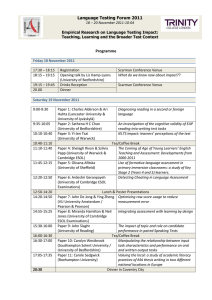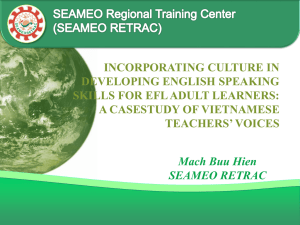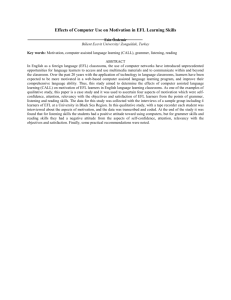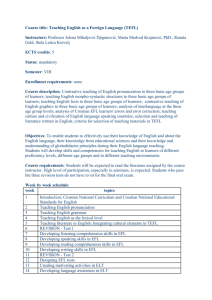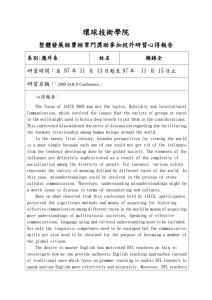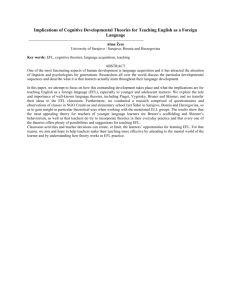15 Warwick International Postgraduate Conference in Applied Linguistics
advertisement
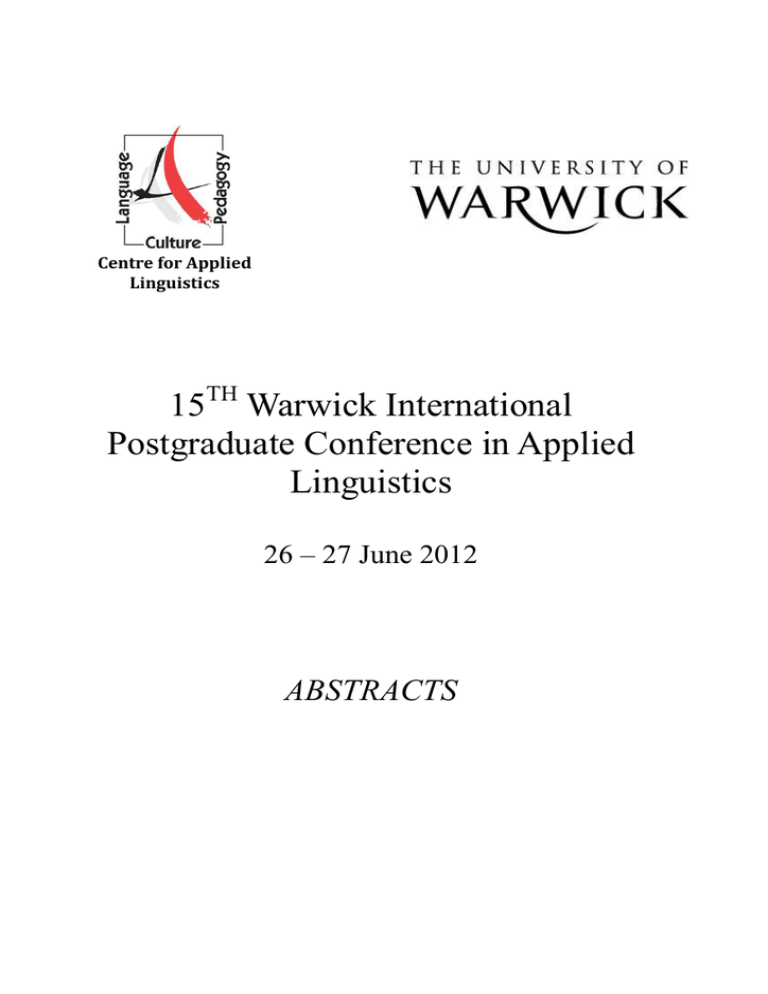
Centre for Applied Linguistics 15TH Warwick International Postgraduate Conference in Applied Linguistics 26 – 27 June 2012 ABSTRACTS Themes The talks are oriented towards investigation of text and discourse, Professional and both written and spoken, in a variety Academic of professional and academic social Discourse contexts PAD ELTED English Language Teacher Education and Development ELLTA English Language Learning, Teaching and Assessment WACC Working and Communicating Across Cultures Page 5 The talks focus on how teacher education and development, complex social, cultural, psychological and educational processes, embedded in particular contexts of practice. Page 11 The talks focus on how language learning is a complex social, cultural, psychological and educational process, embedded in particular contexts. Page 18 The presenters attempt to reveal how the social context (both micro and macro) has a major impact on people‟s language use and interactional behaviour, by drawing especially on work in pragmatics and discourse. Page 25 Posters Page 31 2 The conference is organised by postgraduate students and staff members in the Centre for Applied Linguistics, University of Warwick. We are grateful to the following institutions for supporting the conference this year: Cambridge University Press Equinox Publishing Routledge (Taylor & Francis) Multilingual Matters All abstracts have been reproduced in the original form that was submitted by the presenters. 3 Keynote Speakers for the Conference (Wednesday, 27th June) Prof Anne Burns, Aston University Investigating teacher cognition: Paradigms and methodological considerations Dr Dorien Van De Mieroop, University of Leuven Negotiating meaning in performance appraisal interviews 4 Professional and Academic Discourse PAD Functional English courses for BS degree in Applied Sciences: students’ perceptions Muhammad Nawaz, University of London This paper describes that the students who had been studying the courses of Functional English during BS degree in Applied Sciences often lack effective communication skills. They hesitate while they communicate in English and have general understanding of the language. It is required to investigate whether or not Functional English courses are helpful to meet the needs of their academic life. The data for this study was collected through a questionnaire from 80 out of 148 students, at International Islamic University, Islamabad, Pakistan. The reason for selecting the great sample for the study that it is commonly acknowledged that a large sample size results in greater probability of accuracy (Kahane & Cavander, 2006). The questionnaire was developed keeping in view English for Specific Courses (ESP) approaches. The questionnaire included thirty items. It contained objectives of the course, the contents, methodology, assessment and the means for the improvement of the course. The collected data was analyzed in terms of mean, percentage and frequency. It was found that the aims and objectives of the courses are not provided to all the students. The BS students claim that the speaking and listening activities conducted in the classroom make them confident. The reading skills made them confident in reading the books and articles. They suggest that teachers should focus on practical activities instead of theoretical tasks in the classes. In addition, students complain that the courses are dull and do not attract the attentions and they need the courses which create interest among the learners and they need well trained teachers. 5 A case analysis of teacher feedback on learners’ writing in EAP classrooms: negotiation of ownership, learner identity, and empowerment Zuleyha Unlu, University of Warwick As indicated by Hedgcock (1994, p.141), research on writing has presented a great amount of “empirical data including composing processes, text production, recursive procedures and the contribution of feedback to revision”. Especially with regard to feedback, a number of researchers have questioned the value of feedback itself for writing while a number of other researchers have questioned the efficiency of different types of feedback on writing. However, it is still not clear enough how to provide effective feedback without dominating learners‟ writing, especially in English for Academic Purposes (EAP) classrooms which include students from different backgrounds. That is, how to encourage the development of academic identities of the learners, and how to use teacher feedback in enacting negotiation and learner ownership in EAP classrooms is understudied. Thus, the research I currently work on intends to discover how EAP teachers and students in those classes perceive teacher feedback with regard to its functions in building student academic identities. It also aims to find out what kinds of strategies can be suggested to teachers to ensure that their feedback is clear and effective while at the same time it successfully enacts negotiation, ownership and learner identities. This presentation will have three basic parts. In the first part, I will talk about which aspects the previous research on teacher feedback focused on. In the second part, I will present the theoretical framework of my research. Finally, the piloting phase, which took place at University of Warwick, and where classroom observations and interviews were used as the basic tools will be shared. 6 Power and ideology in the advertisement texts of anti-aging products in Indonesian magazines Rieszkaya Nadia R. P. Dalimunthe, Widyatama University The research is conducted based on the explanations of critical discourse analysis (Fowler, 1996; 1996; 1985; and Fowler et al, 1976) and systemic functional linguistics (Halliday, 2004). The research aims to analyse how the ad writers exercise linguistic features to build their power in the written advertisement texts of anti-aging products in Indonesian magazines, and what ideology is implied by the use of the linguistic features. The data is six advertisement texts of anti-aging products which are most published in the magazines. The research is performed on two analysing level. On the contextual level, the writer explains the whole contextual information of the texts. On the textual level, the thesis writer describes and analyses linguistic features of the texts, and suggest the interrelation between the textual features and the context. The writer describes and analyses the power practice in the ad texts, which eventually implies an ideology. The writer concludes the scientific image of the product and the classification of aging skin as a bad value are constructed to support business importance of those who is behind the ads. The nature of science offers an absolute and powerful basis in the development of the readers' trust, and the good value of youth imposes an understanding about how good to be young. If more women believe it, more products are sold. However, it is detrimental to women because they are forced to stay young to stay “good”, at the same time; there is no solution to make women completely stay young. 7 A corpus-based study of I and We in academic discourse Duygu Candarli, Bogazici University EFL learners show authorial presence with different features of writer/reader visibility, such as first and second person pronouns, imperatives and questions. Whereas there are many studies that focus on writer/reader visibility in published academic articles (see Hyland 1999, 2000, 2001; Harwood 2005), there are still a few studies that investigate this issue in learner corpora, especially in Turkish educational context. This qualitative corpus-based study attempts to find out the differences and similarities of personal pronoun use in academic essays of native and non-native student-writers of English. EFL learner corpora consist of 48 English academic essays written by first year university students at a Turkish university. Data are compared with the Louvain Corpus of Native English Essays. The results indicate that English academic essays written by Turkish students include far fewer pronouns. Besides those quantitative differences, qualitative differences, especially in terms of the functions exist between the essays of EFL learners and native English speakers, which may be attributed to several different factors, such as L1 transfer, writing training and cultural tendencies in writing. 8 A corpus-based examination of appraisal in discussion sections of doctoral theses Yifan Geng, University of Warwick This presentation is part of an on-going research project on the construal of appropriate author stance through the deployment of appraisal resources. Evolved within the theoretical framework of Systemic Functional Linguistics, appraisal is concerned particularly with the interpersonal meanings from the functional perspective. The model of appraisal includes three systems of options for encoding three semantic categories: “attitude,” “engagement,” and “graduation” (Martin and White, 2005). These three systems work together to create an interpersonal stance. This research sets out to analyze and compare the patterns of construing evaluative meanings in discussion sections of doctoral theses written by L1 Chinese and L1 English students. It then attempts to account for any difference found in terms of previous scholarship into English as Second Language Writing. This research also aims to develop a small sample of corpus-based materials designed to help L2 writers express appropriate evaluative meanings in academic research writing. An investigation into email communication between Vietnamese students and their lecturers in a British university Phuong Le Hoang Ngo,University of Southampton Thanks to the advance of technology, email has become a remarkably popular means of communication in higher education institutes. However, since email is defined as a “hybrid medium” which has the characteristics of both spoken and written language ( Crystal, 200;Barron, 2002), writing an appropriate email to lecturers may pose a lot of linguistic and cultural challenges for students, especially international students (Biesenbach-Lucas, 2007; Economidou-Kogetsidis, 2011). By investigating emails sent by Vietnamese students to their lecturers at the University of 9 Southampton, UK in one semester, this research is carried out with a view to answering the following research questions: (1) How do Vietnamese students use email as a means of communication with their lecturers? (2) What affects the choice of forms of address that Vietnamese students employ in their emails? and (3) What are some pragmatic strategies used in their emails? Both qualitative and quantitative approaches are employed to analyze questionnaire, email, and follow-up interview data. The study points out that intercultural communication through email in a hierarchical relationship like teacher-student is quite challenging for Vietnamese students. In addition, despite students‟ effort to adapt to the new culture, their Vietnamese identity still has some effects on their choice of linguistic features and communicative strategies. Therefore, misunderstanding and failure in this online intercultural communication may take place due to a lack of cultural awareness and pragmatic strategies. From the findings, some implications related to TEFL and intercultural communication are suggested, especially those related to email‟s linguistic conventions and pragmatic strategies. 10 English Language Teacher Education and Development ELTED Novice English Language teacher beliefs and practices (A story of a first-year English Language teacher) Arwa Gandeel, University of Leeds Teacher beliefs are a well-established area of inquiry in the field of language teacher education. It is now widely accepted that to understand what teachers do in the classroom we need to gain insight into the beliefs that shape their work. This presentation describes the beliefs and the practices of a novice English language teacher in teaching speaking. „Rana‟ teaches English language to students at the foundation year in a Saudi University. She started working as a teacher after she had her BA in English Language in 2011. She started her job with neither proper teacher education nor sufficient teacher training. Rana‟s case study includes five interviews and three class observations. The first two interviews were conducted before the class observation to know more about Rana‟s background information and basic beliefs. Then, after each of the three class observations, a post-observation interview was conducted to gain deeper insights into her beliefs and to give her the opportunity to explain the rationale of her classroom teaching practice. Discussing beliefs and classroom practice with teachers helps them to reflect on their beliefs and practice, which contribute to their career development. Rana reflected on many of her educational beliefs about herself as a teacher, her teaching, her educational context and her students. Also, she explained the rationale of her educational practice (teaching speaking, feedback and ways of dealing with students). 11 An investigation of the relationship between teacher beliefs and classroom practice in English Language teaching Parvaneh Parvaresh, University of London Over recent decades, research has shown that teachers‟ beliefs underlie their teaching practices, but various factors can affect the consistency between belief and practice. Understanding how teachers implement their beliefs in instruction has significant implications for teacher education programs. This study investigates how teacher cognition – what language teachers think, know, and believe – contributes to the practices of eight high school teachers of English as a foreign language (EFL), with specific relation to communicativeness in language teaching. It enhances our understanding of teaching foreign language from a teacher cognition perspective, particularly with regard to inservice teachers. Drawing on Borg‟s (2006) conceptual framework of language teacher cognition, this study investigates the relationships among teachers‟ beliefs, classroom practices, and interactions in their workplace in a foreign language setting, Iran. It first examines how teachers‟ beliefs are enacted in classroom practice and how the professional contexts in which they work shape their actions and decision-making. Furthermore it explores the reasons for tensions between beliefs and practices and documents the factors that influence belief and practice consistency. To gain insight into the links between teachers‟ stated beliefs and observed practices and to understand how those beliefs are influenced, semi-structured interviews, observations, field notes, and reflective essays were conducted. This triangulation created an in-depth portrait of each participant and provided extensive information. The results of eight case studies are examined and compared. Lastly, the study offers the implications along with recommendations to EFL teachers, teacher educators, and administrators. 12 Technophilia or technophobia: exploring teacher autonomy in learning ICT tools for the ELT classroom Philip Longwell, University of Warwick Technophilia refers generally to having a strong enthusiasm for technology. Technophobia, on the other hand, is a fear or dislike of advanced technology or complex devices. For 30 years or more, the successful operation of computers, laptops and other more recent forms of technology often depends on whether a person is instinctively one or the other type. I wish to argue that, far from being complex, technology is now as ubiquitous and as simple to use as it has ever been and that there is no need for technophobia amongst EFL teachers today.As part of my MA dissertation, I am exploring the area of teacher autonomy in respect of learning about ICT (Information Communication Technology) and the tools that can be used in and outside of the ELT classroom, beginning with the question of „what are teachers actually doing now‟? I will be conducting several interviews , webinars and online „chats‟ with current EFL teachers, their motivation for using them in and outside of the classroom and the technical skills required to be confident of using them successfully. This may also cover the barriers or pressures involved. As an extension of the research carried out for my Professional Practice module, I may also investigate the benefits of using screen capture tools, the technical skills required and how teachers can develop online material for their students. I will also look at the attitude, beliefs and both intrinsic and extrinsic motivations of the teachers to using web tools. 13 Korean EFL teachers’ beliefs about technology-assisted language teaching and practices in the classroom Hanna Lee, Leeds Metropolitan University The use of technology is no longer new in the classroom and the changes in second language (L2) classrooms with the adoption of new or existing technologies are also tremendous. The study focuses on EFL teachers‟ personal beliefs with respect to their teaching with technology. Based on a longitudinal research approach, an argument will be made not only with respect to the process of changes in teacher beliefs but also with respect to the teachers‟ perceptions of the actual effectiveness of their application of technology in their teaching in the classroom. Fourteen participants, who are EFL teachers at primary and secondary schools, and a supervisor, who works at local office of education, participated in this study for eight months. The semistructured interview, classroom observation and diary were used to collect qualitative data. This study is still ongoing to find appropriate results through analyzing data. It is hoped that this study will contribute to better understanding of Korean EFL teachers‟ beliefs when they have actual English teaching experience in using technology in the classroom, and of their perception of the Korean government‟s efforts to promote the use of ICT for their teaching. 14 Motivations of EAP practitioners in British higher education Gosia Sky, University of Warwick This presentation will focus on providing an overview of my PhD research based on the motivation of native and non-native EAP practitioners in British Higher Education. Given the growing literature on teacher motivation in the fields of educational psychology and teacher education, it is quite surprising that the issue has not been given any attention in the context of EAP (i.e. no central statistics on EAP teachers in the entire UK), especially in the light of the fact that teacher motivation can directly influence the motivation and achievement of learners. The study aims to address this gap, investigate the reasons why EAP practitioners from different backgrounds teach in BHE, how they perceive their motivation, its fluctuations and factors that may affect it. The research on the motivation of EAP teachers seems to be particularly interesting in relation to the 'native speaker criterion', which, referred to by some as a myth, still seems to play an important role in the ELT sector, leading to potential discrimination of non-native practitioners also in British academic context, despite the Policy of Equal Opportunities (2010). Taking into consideration that this is a study in progress with ongoing data collection, I will present the methodology behind the project including a three-stage mixed-methods design and review the key points from the literature regarding teacher motivation. 15 Team teachers and team teaching relationship in Korean primary schools Jaeyeon Heo, University of Warwick This study investigated team teaching between native English speaking teachers and Korean English subject teachers in Korean primary schools within the EPIK (English Programme in Korea) scheme. In particular, this qualitative case study focused on their classroom interactional relationship. Team teaching has been common in the EFL (English as a Foreign Language) classrooms in East Asian countries (e.g. Japan, Hong Kong, Taiwan), especially in public school systems. Korea is not an exception in this trend, and there has been a huge investment in the EPIK (English Programme in Korea) scheme in English education. In this government funded scheme, team teaching (between a native English speaking teacher and a Korean English subject teacher) has been implemented in a wide range of Korean primary and secondary schools. The purpose of this presentation is to discuss how to enhance the strengths of team teaching between team teachers through a greater understanding and sensitivity to the nature of their interactional relationship in EFL classrooms. In this session, I will focus on the dynamics of interactional relationship and the factors that determine the quality of team teaching relationship in these varying teaching contexts. I will begin by summarizing changes of English educational policy in Korea, then briefly introducing the scheme in relation to recruiting native English speaking teachers. I will present my qualitative research, featuring four pairs of team teachers in different primary schools. The presentation draws on a range of data-sets (including classroom observations, interviews, and fieldnotes) to highlight key issues which impact on successful teaching relationships. As well as presenting the key outcomes of the data analysis, training implications and ideas for further development of the EPIK scheme will be discussed. 16 English team teaching collaboration: The interaction experiences of Vietnamese English Teachers (VETs) and Native English-speaking teachers (NESTs) collaborating in Vietnamese universities Khanh Tran, University of Warwick This study seeks to address a gap in the team teaching collaboration research literature on NESTs and Non NESTs at university level in EFL contexts. It aims to investigate the collaborative interaction experiences between NESTs and VETs in their English team teaching at Vietnamese universities, with a special focus on relationship issues. A longitudinal study with teacher participants based on a qualitative case study research design was carried out employing multiple data collection methods including semi-structured interviews, classroom observation, note-taking, audio/video recording and documents. Data from the study will be analysed to develop a thick description of the teachers‟ team teaching experiences, and collaborative interactions in lesson planning meetings, in-class teaching and informal events. Since the data analysis has not been completed yet, this presentation will focus on providing an overview of the data collection process and on presenting an analysis of the first phase of data collection. 17 English Language Learning, Teaching and Assessment ELLTA Researching international Chinese students’ strategic vocabulary learning in context: the role of agency, mediation and learning environments Kai-Hui Wang, University of Warwick During the past thirty years, a large body of second language research has targeted vocabulary learning strategies (VLSs) from a cognitive perspective (e.g. Nation, 1990; Gu and Johnson, 1996). However, the critiques of the cognitivist approach of VLSs continued to increase in number in the literature. In order to overcome the theoretical weaknesses, I propose a theoretical framework which creates a synthesis between both cognitive and sociocultural approaches and use it to understand strategic vocabulary learning better and deeper. The aims of my study are to explore the experiences of international Chinese students learning English vocabulary, to analyse their processes of strategic vocabulary learning from both cognitive and sociocultural perspectives and to gain a dynamic understanding into their capacity for self-regulation of strategic vocabulary learning. The Chinese participants were selected from a preuniversity programme at three British universities. In relation to my research aims, an embedded multiple-case study design which employs a set of qualitative methods was used to work with the target phenomena temporally and contextually and explore the complexities of it. In order to understand better the students‟ changes and development in strategic vocabulary learning, I therefore conducted a longitudinal study in three phrases during their academic year (2011/12). 18 A cross-sectional evaluation on the relationship between Turkish EFL learners’ vocabulary size and vocabulary learning strategy Yusuf Ozturk & Seray Tanyer, Anadolu University Vocabulary is regarded as an important aspect of language proficiency and the use of vocabulary learning strategies leads to effective vocabulary learning. Considering this interrelationship, different studies have been conducted to probe the dynamics of vocabulary learning. In this sense, the current study attempts to examine this issue for EFL university students. It aims to investigate the relationship between Turkish EFL learners‟ vocabulary size and vocabulary learning strategy use. To conduct an in-depth investigation, a cross-sectional and mixed research design was adapted and 80 ELT majors from 1st to 4th year participated in the study. Three instruments were employed in the three-week data gathering process. To measure the participants‟ vocabulary size, Vocabulary Levels Test (VLT) was used. To reveal the participants‟ vocabulary learning strategy use, Vocabulary Learning Strategy Questionnaire (VLSQ) was administered. Additionally, a survey with five real-life like situations aiming to reveal the participants‟ own accounts of strategy use was developed and conducted. After the quantitative and qualitative data were collected, multiple regression test was used to analyze the data gathered through VLT and VLSQ. Then, content analysis was performed on the participants‟ responses in the survey. Data reporting is still in progress. The results would be discussed with reference to the related studies, probing the interplay between vocabulary knowledge and strategy use in an EFL context. In line with the results, implications and suggestions would be presented. 19 An investigation of the implementation of communicative language teaching approach in Vietnamese higher education Thao Nguyen, University of Southampton The implementation of communicative language teaching (CLT) approach in EFL settings has been reported to face many challenges due to the local contexts. Contributing to the research field from a different perspective, this study investigates the application of CLT in Univeristy of Languages and International Studies, Vietnam. The International Standard Program in which students coming from different majors study English in one year to prepare for their academic learning, is the research setting. The questionnaire and interview examine both teachers and students‟ reflection of the approach implementation as well as students‟engagement and motivation in the teaching and learning process. It has revealed that the program has applied major principles and made some adjustments to the local setting. Both teachers and students are aware of maximizing the target language use and minimizing the native language; teaching grammar communicatively, employing communicative activities, pair work or group work as much as possible; avoiding immediate error correction and making use of authentic materials. CLT is really employed and does work in this context in relation with student engagement and involvement. To this aspect, it brings a new impression on the CLT adoption in English language teaching in Vietnam, which is often examined with challenges and even failures of the approach. However, like other EFL contexts, teachers here also have to make adaptations to fit student‟s need and ability. That is to say, in foreign language learning, context may decide the way an approach work, and this can be different from one to another. 20 Investigating the notion of authenticity in English language teaching and learning in Turkey Erkan Külekci, University of Warwick The notion of authenticity has been revisited and discussed in the field of English Language Teaching (ELT) over recent years. Particularly, regarding communicative approach as an effective means of foreign/second language teaching has brought the concept into the focus of ELT researchers and practitioners. Although the concept is often limited to the quality of texts used in language teaching, it is also concerned with classroom tasks and language learners‟ and teachers‟ involvements and decisions. From philosophical perspective, an authentic experience, indeed, refers to having genuine feelings and beliefs as well as making own choices. Addressing how teachers and learners authenticate the process of language teaching and learning, this presentation will introduce an ongoing research process on authenticity in ELT. The main aim of the study is to explore the nature of authentic experience in the context of language teaching in Turkey. This presentation will outline three main points: First, the trajectory of the use of the term „authenticity‟ through ELT history will be briefly presented before the gap in research on authenticity in ELT is highlighted. Then, the theoretical framework of the present study and a model for conceptualisation of authenticity in the language classroom will be introduced. The proposed model encompassing social constructionist and social constructivist perspectives aims to provide a coherent and effective framework to discuss the characteristics of authentic experience in ELT context. Finally, the research questions and the case study design and particular research methods adopted in this study to answer research questions will be presented. 21 Bringing English idioms home to Greek learners: A qualitative study Despoina Panou, University of Leicester The importance of idioms in human language as well as their ubiquity in the general vocabulary of our linguistic repertoire has been observed by linguists and language teachers alike (Chafe, 1968:111; Jackendoff, 1997:177; Liu, 2008:xiii). In fact, mastery of idioms has been an important indicator of second-language proficiency since many second-language learners rarely learn or use idioms appropriately (Yorio, 1989:64). The aim of the present paper is to examine Greek learners‟ comprehension and production errors in L2 idiom learning. To this end, a questionnaire comprising of four exercises - two focusing on receptive skills and the other two on productive ones - was distributed to 50 Greek native speakers of advanced English Proficiency. The results obtained indicate that Greek learners of English are better at understanding the meaning of L2 idiomatic expressions through the use of contextual information and conceptual knowledge whereas they have a considerable difficulty in accurately producing idioms since they make structural mistakes or use them with the wrong connotation or in the wrong context. 22 International Foundation students’ perceptions on native and non-native English Language teachers Hazel McAllister, Leeds Metropolitan University The continued discrimination of native-speaking teachers in the ELT job market continues to be a hotly debated topic. Despite non-native teachers‟ qualifications and experiences they find they are rejected at the first stage of the recruitment process because of they are not considered native speakers. Institutions justify this by stating that this is because of student‟s demand. Despite the weight given to what the student is perceived to want, little research has actually been conducted on student preference. And of this very little has been set within the UK. This study explores the perceptions of foundation students studying in the UK towards native and non-native English speaking English language teachers. The purpose of the study was to extend previous studies‟ findings and to allow students‟ own voice to be included in the body of research. It asked how these students perceived their native and non-native English speaking language teachers and whether they thought both could be good language teachers. The study asked participants to write a short essay on the topic of between 500 -1,000 words.. This study only partially supported previous studies. It found that students perceived both groups of teachers to have different strengths and weaknesses, which corroborates findings from other studies. However, none of the participants felt they would recommend a non-native teacher to a fellow student. And while some maintained that both could be good teachers, the majority felt native speaking teachers were the best. 23 Eliciting Information on the Cognitive Processes used during Academic Listening: Questionnaire Development Method Mala Palanichamy, University of Warwick The insuperable influence of listening on academic performance of undergraduate and graduate students has been well-established by research. However, there has been little research to unravel the elusive cognitive processes used by a listener during lecture listening. Since listening is a private process it is important to elicit this information from listeners through asking them about their experience. Work done in the area of strategy-use has shown that near authentic data can be gathered from pausing the speech input and getting listeners to think-aloud the exact process they are currently using to tackle the input. Since this approach is not practical in real-life lecture listening conditions it became important to develop a questionnaire with easily recognizable information that could be ticked off either during or immediately after listening to a lecture. Additionally, information-processing can be highly automatised in advanced listeners therefore it became important to provide prompts through the questionnaire to elicit conscious-noticing and reporting. The questionnaire was to be used to collect base-line data about cognitive processes used while listening to a full-length lecture. This was to be later compared with data obtained from the reported processes used during lecture listening tasks in a proficiency test. The presentation aims to outline the method used to develop a practical questionnaire and the various considerations that influenced its construction. Feedback on the questionnaire development will be very beneficial since this is my first attempt at the process. 24 Working and Communicating Across Cultures WACC A longitudinal investigation of the intercultural interaction experiences of postgraduate East Asian students studying for a PhD at a UK university Andrew Davidson, University of Warwick This presentation will provide an overview of my PhD research focus and the data collection tools I have developed. The PhD study aims to explore the intercultural interaction experiences of a small sample of postgraduate East Asian international students studying for a PhD at the University of Warwick. More specifically, the study seeks to investigate the ways in which the participants are both engaging in and „investing‟ in the experience of intercultural interaction within the following domains: academic, socialising, daily life and work. In addition, the study aims to explore what barriers to intercultural interaction the participants are experiencing, the ways in which they attempt to overcome such barriers, and what growth might be occurring in terms of their desire and awareness/knowledge of how to become effective intercultural interactants. It is hoped that an in-depth picture of the nature of the participants‟ intercultural interaction experiences and the issues connected with these experiences will emerge as the study progresses. 25 Examining multilingual students’ narrative stories, exploring multilingual identities Elena Xeni, University of Cyprus This study investigates aspects of the multilingual identity of 50 multilingual undergraduate students studying for a BA degree in educational sciences in Luxembourg. More specifically, the study focuses on 50 narrative stories the students provided about their multilingual identities and discusses the following: 1. What do the students‟ narrative stories reveal about their families attitudes towards multilingualism? 2. How do the students report on their multilingualism and their oral and written skills in the four languages they master? 3. What is revealed through the narrative stories about language as a communication system, the values put in languages and the process of language learning? 4. What do the narrative stories point out concerning students‟ multilingual identity? The main findings of the study are presented and concluding thoughts with regards to major and minor aspects of multilingualism are highlighted. Is culture an issue in multicultural teams? Mary Vigier, University of Warwick Cultural diversity in workplace teams encompasses a range of components, including differences in national origin, professional background, gender and age. Corporate culture constitutes an additional element. While culture may influence interactional styles and behaviour, recent literature points to the importance of not over-emphasising the role national cultural dimensions play in multicultural business contexts. Instead, these studies have called into question the „cultural‟ aspect of intercultural communication (Sarangi, 1993) and have avoided explaining differences in 26 intercultural interactions in narrow cultural terms based on single cultural variables (Rogerson-Revell, 2007). This paper reports on research conducted on multicultural teams operating across linguistic and cultural boundaries during a management integration programme within a multinational company in France. Taking a social-constructivist view, I will look at a series of intercultural meetings to explore the question of whether culture may or may not be an issue for participants. More specifically, I will concentrate on: participants‟ perceptions as reflected in individual interviews, most of which were audio-recorded; participants included: - team members who participated in „problem-solving tasks‟ - corporate moniteurs who coached the team encounters my own interpretations based on observations of the problem-solving activities The multicultural teams were carrying out decision-making exercises within a management integration programme to find solutions for problems that had recently occurred within the company but that had previously been resolved. Initial findings indicate that a range of social variables in addition to national culture also play a crucial role, e.g. language and corporate culture. 27 Beyond member-checking: a dialogic approach to the research interview Lou Harvey, University of Manchester This paper will present the research design for my ongoing PhD research, a narrative study of six international UK university students‟ motivation for learning English. My research aims to foreground the experience of learners, whose voices have rarely been heard in past second-language motivation research, through their stories. My interest in learners‟ voices and my wish to understand and render their experience has led to a concern with representing their language-learning stories in such a way that they recognise and feel ownership of their stories, at the same time as my treatment of these stories is sufficiently interpretive and academic to satisfy research rigour. Furthermore, as a researcher I feel that if I am to genuinely see the people I am working with as responsible, thinking agents, I have a responsibility to give them the opportunity to theorise their own experience. Thus I am developing a research design which allows me to directly reflect these concerns. To illuminate this process, I will begin by outlining Mikhail Bakhtin‟s concept of dialogism (1981, 1986), which has been fundamental to the development of my design. I will then share my dialogic research design, demonstrating my attempt to move towards a more explicit coconstructedness which acknowledges my participants as theorists of their own experience. Although still a work in progress, I hope to show that a Bakhtinian methodological framework offers theoretical justification for this position, and that my dialogic research design enables me to actively practise what I theorise. 28 Considerations in research with children Samaneh Zandian, University of Warwick Much attention in the educational literature has been devoted to children‟s changing roles in research that concerns their lives. Therefore, there has been a shift from conducting „research on children‟ toward carrying out „research with children‟. When the participants of the research are children some issues are of more importance; and this is because of children‟s different way of experiencing the world and the way in which they communicate. It is important to take into consideration whether the existing research methodologies designed for adult participants are suitable for children as the participants or not. In this paper, I attempt to raise some of these critical issues which need consideration when children are the participants of the research. I will provide examples from my research about children‟s understanding of adaptation process and international encounters, and will raise some questions about the factors which need to be considered when we are researching with children. Research method, location, language, confidentiality and trusting relationship, use of instrument, power relation between the researcher and the participants, and number of the participants are some of the issues which will be discussed in this talk. 29 L2 creative writers around us: how they are made, what drives them to write, and a glimpse into their story-writing processes Yan Zhao, University of Warwick This presentation focuses on the process of my rather explorative PhD research investigating the life histories and writing processes of fifteen L2 creative writers. It shows how data analysis schemes were assembled through an ongoing and often frustrating recursive process of data examination, trial coding, and adjustments. In terms of its ontological stance in theory construction, my PhD research falls under the relativist paradigm. My approach to data interpretation adopts a hermeneutic, explanatory, and inductive model of analysing the identities of individual writers. However, despite its predominantly qualitative nature in data collection, the research embraces elements of quantitative coding methods. There tends to be a typically romantic notion that creative writers and creative writing practices are primarily driven by inspiration, god-given talent, unpredictability and emotion – characteristics which are hardly amenable to analysis. This research attempts to show that L2 creative writing practices and identity issues can indeed be systematically investigated without resort to the pitfall of anecdotal story-telling by combining across-the-board quantitative coding with selective and highly descriptive qualitative interpretations. I will discuss in detail how I have addressed the practicalities and stumbling blocks encountered during my fieldwork with fifteen L2 creative writers coming from a variety of socio-cultural and educational backgrounds and possessing diverse and vibrant personalities. I also will mention how I dealt with the ethical issues involved in making judgments (as a researcher always does) on personal creative writing performances. Overall, I hope to show how I tried to balance different research goals and integrate different sources of data into one coherent investigative endeavour. 30 Poster Presentations Promoting students’ metacognitive awareness and metacognitive regulation on reading strategies in a higher education context in Pakistan Bushra Ahmed Khurram, University of Warwick This poster reports on an action research study that aims to explore how metacognitive awareness and metacognitive regulation on reading strategies could be promoted in Pakistani ESL university level students. Further, the study seeks to observe the changes in students‟ awareness and regulation of reading strategies as a result of the instructions. The participants of the study will be Pakistani students studying English as a Compulsory subject in a public sector university of Pakistan. The number of participants will be around 35 in this study, ranging in age from 18-20 years. The basline data for the study will be collected by means of a reading test, questionnaire and interviews. The data during the intervention will be collected by means of interviews, field notes, end of lesson feedback, reflective journal maintained by the researcher and learner diaries. The data for the post intervention phase will be collected by means of questionnaire and interviews. 31 The effect of immediate feedback on the perception of Mandarin lexical tones by non-native speakers Cong Zhong, Newcastle University Lexical tone is one of the most difficult issues in learning Mandarin as a foreign language, in terms of both perception and production. Non-native speakers of Mandarin tend to process tones together with other segmental features as consonants and vowels, while native Mandarin speakers process the tone as a suprasegmental feature. (Goldsmith 1979; Leben 1973; Zeng & Mattys 2011). In order to improve the perception of lexical tones, various efforts have been made by training non-native speakers (Wang 1999). Immediate feedback, as an essential and efficient part of perceptual learning, however, is ignored by previous studies. This study examines the effect of immediate feedback on the perception of lexical tones by non-native speakers of Mandarin. 26 non-tonal language speakers are given an AX discrimination task by judging whether the 80 syllable pairs recorded by the researcher have the same tone regardless of the consonants or vowels, e.g. ba214, pu51; or, ma55, mu55. The researcher provides feedback on the correctness of each judgment to the 13 participants in the experiment group while no feedback is given to the other 13 participants in the control group. The result shows that immediate feedback has an evident effect on the perception of Mandarin lexical tones both within the experiment group and between the experiment group and the control group. It can provide a new perspective of teaching Mandarin in classrooms as well as making use of new technologies to assist learning in the form of simple immediate feedbacks. 32 Intercultural learning and foreign language development during ERASMUS student exchange Gianna Hessel, Oxford University Participation in the EU‟s ERASMUS programme and student exchanges in Higher Education in general has become a mass phenomenon. Therefore, the effectiveness of such programmes in achieving their widely assumed beneficial educational outcomes merits closer scrutiny. This longitudinal study, which forms part of a D.Phil. thesis, will investigate whether and in what ways participation in the EU‟s ERASMUS student exchange programme contributes to the development of affective and cognitive aspects of intercultural competence, including foreign language proficiency, in the context under study. Special emphasis will be given to exploring the role of interactions among international students and the role of the students‟ foreign languages self-concept for the development of affective components of intercultural competence (intergroup attitudes). To this end, a natural experiment with concurrent mixed methods will be employed, in which German undergraduate students who applied for the EU‟s ERASMUS exchange scheme for the academic year 2012-2013 and have either been accepted onto the programme or rejected in accordance with the institutions‟ varying selection criteria will form the experimental and control groups. Recommendations regarding preparatory, in-programme and follow-up interventions for facilitating learning in these domains during ERASMUS exchanges will be made. 33 Dyslexia of young learners Maria Nikologianni, University of Warwick The term „dyslexia‟ originates from a combined Greek word meaning difficulty (dys) and language (lexia). It was first coined in 1887 by Rudolf Berlin in Germany to describe the inability to read. Lerner (1989) noticed that this impairment affects 3-10% of school children and it is also associated with educational, social, emotional and economic repercussions (Spreen 1988). It is closely linked to complexities that relate language functions, such as reading and spelling, and it is independent of general intelligence. This phenomenon is highly common in SLL (second language learning) affecting the learning process and to a greater extent the writing skill. Being an invisible disability, it is mainly caused by a difference in brain structure that it is present at birth or after a brain injury and it is generally hereditary (developmental). Due to the fact that the L1 acquisition occurs somehow effortlessly and unconsciously, the L2 achievement needs more endeavor. For this reason, the role of the teacher should be that of facilitator and supporter of their learning methods. In such a way, motivation levels are enhanced and positively forced force students to learn. Lastly, a foreign language tutor should bear in mind the following when dealing with dyslexia in the classroom: (a) accuracy on L2 oral presentation patterns, (b) range and flexibility of the source text, (c) pronunciation practice, (d) audience awareness, (e) use of relevant questions for initiating peer or group discussion, and (f) adaptation and adjustment of information effectively for meeting the needs and the purposes of the audiences. 34 Assessing the impact of error analysis in oral performance enhancement of trainees from the EFL teacher training program by means of the generation of a Chilean corpus of spoken texts Maritza Ortega, Universidad de Santiago de Chile The following research project reports the implementation of syllabus innovations in EFL teacher education in Chile after diagnosing a lack of language achievement standards common to all EFL teacher training programs offered in public and private universities. The aim of this study is to collect linguistic data – EFL trainees‟ intermediate status between their native language (Spanish) and the target language (English) – in order to create the first Chilean corpus of spoken English as a foreign language in the interest of analyzing the errors that are most likely to be made by Spanish speakers. Once the results of this exercise are available, a new sequenced syllabus founded upon the Content-Based approach and tailored to the students‟ needs will be designed. Developing a pedagogical framework for teaching the Chinese aspect marking system: a comparative study of grammartranslation and communicative approaches Qiaochao Zhang, Aston University The L2 acquisition of Chinese aspect has been investigated by many researchers (Sun, 1993; Zhao, 1996; Wen, 1997; Teng, 1999; Duff and Li, 1998, 2002; Jin and Hendriks, 2005; Ma, 2006). Their studies show two main findings, one is the acquisition order of the aspect markers (e.g. zai, zhe, le, guo), and the other is the accuracy in using the aspect markers. Among those, only Duff and Li (2002) mentioned the effect of teaching on the accuracy of using Chinese aspect. However, it is unknown what impacts teaching methods/approaches could have on learners‟ use of the aspect markers. This paper aims to contribute to filling that gap. It explores whether a specific teaching 35 framework assists the learning of Chinese aspect markers by L2 learners. We design a session of Chinese aspect following the acquisition order of the Chinese aspect markers in the research findings. The session is then delivered to two groups of beginner level learners in a UK university using different teaching approaches. One is the grammar-translation approach, which focuses on learning of aspectual forms, and the other is the communicative approach, which focuses on meaning. The learners take a pre-test assessing their general knowledge of Chinese, an immediate test after the teaching session on aspect to compare the immediate impact of teaching approaches, and a post-test after two months to trace the lasting effect of the teaching approaches. The investigation aims to find out whether the grammar-translation approach leads to learners‟ higher accuracy levels than communicative approach in using aspects in grammatical tasks, and whether the communicative approach leads to learners‟ better use of aspect than the grammar-translation approach in comprehension tasks. 36 NOTES 37 38 Thank you for your participation. 39 40

